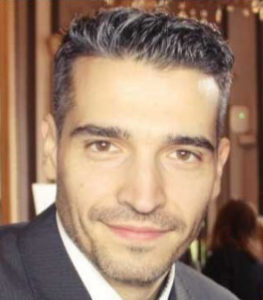 On Wednesday, March 15th 2023, we have the pleasure to welcome in SPINTEC Prof. Flavio Abreu Araujo from Institute of Condensed Matter and Nanosciences UCL Louvain. He will give us seminar at 16:00, entitled :
On Wednesday, March 15th 2023, we have the pleasure to welcome in SPINTEC Prof. Flavio Abreu Araujo from Institute of Condensed Matter and Nanosciences UCL Louvain. He will give us seminar at 16:00, entitled :
Neuromorphic Spintronics: Doing more with less
Place : SPINTEC Seminar, CEA Building 10.05 auditorium 445 (access needs authorization *)
skype link : https://webconf.cea.fr/philippe.talatchian/6PV6Y9C5
Abstract : Over the past decades, artificial intelligence (AI) has made significant technological advances with the prospect of increased computer capabilities (e.g., automation in decision making and data processing) and acquired an increasingly important role in our everyday technological environment (Dall-E, ChatGPT, etc.). The main issue is that the current computing technologies relying on CMOS (Complementary Metal–Oxide– Semiconductor) are very energy-intensive while solving cognitive tasks such as speech or image recognition.
One of the reasons for such high energy consumption using conventional computers arises from the so- called von Neumann bottleneck, i.e., the fact that in such computers the data must be shuttled back and forth from the random-access memory (RAM) to the central processing unit (CPU). A more efficient approach for processing data would be to mimic the human brain capabilities as the data is stored locally where the computation occurs. This is the main idea behind the design of neuromorphic computing hardware. Nevertheless, neuromorphic computing is not meant to replace our conventional computers, but to complement them for specific tasks. Indeed, conventional computers are designed to solve very complex numerical problems with high precision whereas the human brain performs many low-precision calculations in parallel while solving cognitive tasks like recognizing a familiar face.
In the framework of the emerging field, I contributed to create called neuromorphic spintronics we combine condensed matter physics and artificial intelligence to design nanoscale neuromorphic computing hardware. The physical building block considered in our research program to implement such bio-inspired hardware is the magnetic tunnel junction (MTJ). MTJs are made of two ferromagnetic (FM) layers and a non-magnetic insulating barrier (often 1-2 nm of MgO) separating the two FM layers. This device is one of the main objects under study in spintronics, a field of electronics where not only the charge but also the spin of the electrons is considered. MTJs exhibit a high sensitivity to magnetic fields and have been used for two decades as main active elements in the read heads of data storage devices like the hard disk drives (HDDs) of our computers (now progressively replaced by solid state drives, SSDs).
When a sufficient current intensity is injected into an MTJ, it is possible to turn it into a spin-transfer nano-oscillator. Here the magnetization of one of the FM layers of the MTJ is fixed and serves as a spin- polarizer whereas the other FM layer is called the free layer as it can be driven by a spin-polarized current so that its magnetization oscillates. At the nanoscale, the aspect ratio of the MTJs is such that the magnetic ground state of the free layer is the magnetic vortex. The vortex is a curling in-plane magnetization distribution with at its core a singularity where the magnetization is pointing out-of-plane. We call that kind of oscillators the spin-torque vortex oscillators (STVOs).
In this seminar, I will give you an overview of the research activity of the Neuromorphic Spintronics Group and how we turn STVOs into nano-neurons and nano-synapses.
Biography : Flavio ABREU ARAUJO is an F.R.S.-FNRS Research Associate and Professor at the Université catholique de Louvain in Belgium (UCLouvain). He earned a master’s degree in Civil Engineering at UCLouvain in 2010, and he completed his PhD in Solid State Physics at UCLouvain in 2015 under the supervision of Prof. Luc PIRAUX. Flavio was a Postdoctoral CNRS Researcher in the group of Dr. Julie GROLLIER at Unité Mixte de recherche CNRS/Thales in Palaiseau, France. From 2018 to 2021, Flavio was a Chargé de Recherches FNRS in the IMCN institute at UCLouvain in the group of Prof. Luc PIRAUX. From 2020 to 2022, he initiated the “Neuromorphic Spintronics Group” in the framework of the European project SPINAR as principal investigator. https://flavio.be
(*) Persons who do not have a CEA badge must request an entry authorization sufficiently in advance, before March 05th at admin.spintec@cea.fr
(**) IF THE LINK DOES NOT WORK,
try with skype web App : https://webconf.cea.fr/philippe.talatchian/6PV6Y9C5?sl=1
or by phone +33 1 69 35 55 10 conf ID : 3799001120




